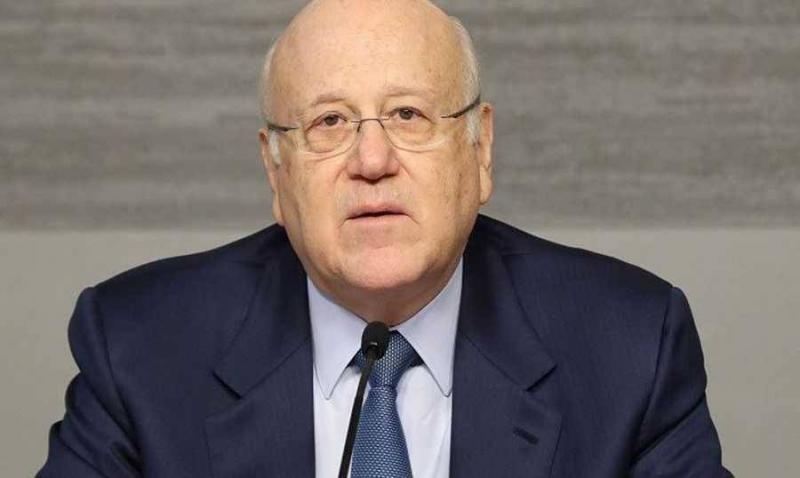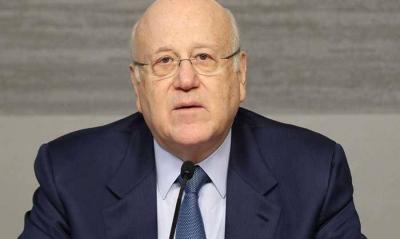Prime Minister Najib Miqati and Foreign Minister Abdullah Bou Habib have been informed of a decisive European stance rejecting the measures and assaults targeting Syrian refugees following the murder of the Lebanese Forces official Pascal Suleiman. Miqati also received a series of calls from European ambassadors in Beirut and international organizations, urging him to take immediate action with military forces to stop the assaults on Syrians and open roads. They expressed their objections to the attacks, leading to the Lebanese Army deploying widely to ensure order on the ground.
It was reported that various organizations and UN employees have checked on the conditions of Syrians who suffered violence and beatings, providing them with assistance and guarantees for their protection, and encouraged them to file legal complaints. The situation is still under follow-up by Western embassies, according to "Ad-Diyar."
Recent information indicates that Lebanon's image abroad, particularly within major US and European media outlets, has been tarnished, as reports and images of the attacks on Syrians dominated global news bulletins and newspaper headlines, containing sharp criticisms of the state, political parties, and anyone who harmed the refugees.
The firm European interventions and messages rejecting the continuation of assaults led to a shift in rhetoric, moving away from the hostile atmosphere that accompanied the initial hours of the kidnapping incidents. The swift actions taken by the army and security agencies to uncover details of the crime and share information with media outlets contributed to a sense of calm, which the embassies received positively.
European embassies provided their countries with video footage of the attacks and threats, focusing notably on statements made by the Minister of Displaced Persons, Issam Sharafeddine, about the existence of 20,000 armed individuals among the Syrian refugees awaiting the right moment to act. This statement was widely circulated on social media in Lebanon by various political parties and groups, exacerbating tensions and chaos, which later clarifications could not resolve.
Furthermore, discussions about an imminent explosion in the country and falling into sectarian strife are viewed as exaggerated and unhelpful, as such strife requires two parties, and both Hezbollah and the Amal Movement are not likely to be drawn into conflict regardless of the provocations. This resolution is firm, as all security officials know that Hezbollah's communications with the Syrian leadership led to the swift handing over of Suleiman's body to Lebanese authorities, along with efforts from Major General Hassan Shukair in security.
It was also noted that the Americans are not currently inclined to provoke instability for various reasons. The US ambassador personally intervened to manage reactions and rationalize discourse through direct communications with political, security, and religious officials, advocating for calm and composed speech, while expressing confidence in the army's investigations. It is worth noting that the US ambassador will be leaving for her country for a vacation which may last over a month.
Observers of the issue believe that the displacement crisis is prolonged and complex without ready solutions, as the state lacks a comprehensive plan. Continued piecemeal responses and reactions will cause the displacement file to fluctuate from one crisis to another, exposing the country to all negative possibilities. The Syrian displacement now poses an existential threat to Lebanon as a whole, representing a ticking time bomb that could explode at any moment.
Miqati and most ministers attending recent meetings with European ambassadors at the Grand Serail were clearly informed of the comprehensive international backing for this file at all levels, and they were informed of a European decision to increase financial support for displaced persons, including contributions toward rental payments and enhanced social benefits, in contrast to reductions for Lebanese institutions managing the file, specifically affecting recently arrived Syrians.
Additionally, most ambassadors have adopted a non-diplomatic tone when discussing the displacement file, issuing a series of accusations against Lebanese officials regarding how financial aid is being utilized, and the disappearance of millions of dollars within the corridors of ministries and fake associations linked to favored individuals among the elite. They also relayed a clear international decision rejecting the return of any refugee to their homeland under President Bashar al-Assad’s regime, regardless of the justifications given, with a degree of Lebanese responsiveness to this decision, despite some timid measures by Minister Issam Sharafeddine regarding return convoys. This official stance has restricted Syrian-Lebanese meetings to occasions without substantial outcomes.
Most ambassadors have called for the opening of job opportunities for refugees across all sectors without exception, halting any discriminatory procedures, and intensifying security measures at coastlines to prevent any Syrian from departing for European countries. They expressed their support for the Cypriot perspective on the need to stop the boats of death, warning that otherwise, there would be measures against Lebanon.
The ambassadors affirmed the necessity to adhere to international conditions and mandates regarding refugees, warning Lebanon of further punitive actions if they are not met. The fundamental question for the state remains: Is the response to restrict Syrian movements after 8 PM, prevent their entry to certain places, or threaten them with eviction from specific areas, humiliating their dignity and families? Or should there be serious dialogue with the Syrian state and the United Nations to establish a clear roadmap for addressing the issue and holding the UN accountable for its responsibilities?
Moreover, many municipalities that imposed symbolic taxes on Syrians in exchange for municipal services faced stringent measures from the Interior Ministry, being instructed to return funds to the refugees as per UN requests. All officials are aware that smuggling networks between Lebanon and Syria operate uniformly, with profits shared among prominent individuals involved in looting from various directions.
Finally, one might ask: where are the British towers and their surveillance involving refugee movements? Why are these not handed over to the Lebanese state? According to "Ad-Diyar."




